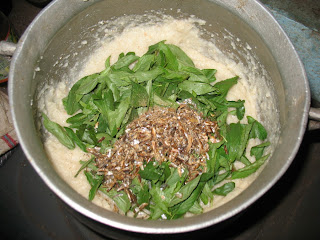I’ve been
watching my site mate’s dog, Lux, off and on for a while now. Lux, meaning
light in Latin, is well behaved and I thoroughly enjoy my status as the Aunt
Spoiler. PCV Katy Todd intends to bring Lux stateside when she returns in June,
but for the month of April, Katy will be in Italy visiting family and friends.
This of course means Lux will be with me and I couldn’t be happier. It’ll be nice
to have a little company mid hot season. At the same time, Lux is getting older
and Katy and I are doing are best to stop Lux from getting pregnant before she
leaves Togo so I’ll be on her like a mother on a teenage daughter.
For roughly a month, Lux will stay chez moi and I asked Katy to educate me on how to prepare her meals. And unfortunately in Togo, it means more than grabbing a bag of Kibbles 'n Bits and filling a bowl. There’s no dog food in Dapaong. It exists in Lomé, but the capital is also 12-13 hours away.
In Togo, most
dogs eat pâte like Togolese because
it’s inexpensive and it’s everywhere. Few Togolese take into account the
nutrients needed to keep a healthy domestic animal, thus many throughout the
country are very malnourished. It’s
often painful to see them searching for food in villages and even in cities.
Katy, on the
other hand, did her research and found ingredients needed for Lux to be happy
and healthy.
And this is how
she does it:
 |
| Ademé, a common leafy green in Togo that’s often cooked with a sauce. |
 |
| Katy saves and washes her eggshells for Lux, which are then crushed and added to boiling water. |
 |
| A little oil added to boiling water and crushed eggshells. |
 |
| Dried fish for protein that is also crushed. |
 |
| Ground dried corn that is mixed with water to acquire pâte. |
 |
| Boom. Dog food. |
And there you
have it: dog food in Dapaong. This will be part of my daily routine for almost
a month and it’ll be a nice change to cook for two—even if it’s not the same
meal.
Until next time… J